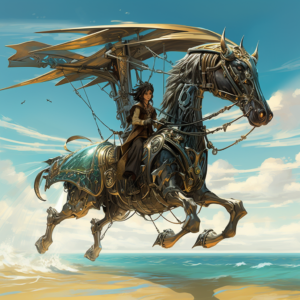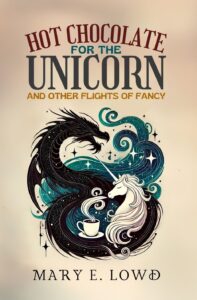by Mary E. Lowd
Originally published in Hot Chocolate for the Unicorn and Other Flights of Fancy, December 2024

Seven riders on six horsebacks and one mechanical contraption, each of the seven blessed with wings, flew toward the sea.
The horses’ wings were made of tawny feathers, golden when the sun hit them right, downy and angelic. The mechanical contraption’s wings were less wings and more of a spinning rotor in a tarnished shade of silver, held above the rider by a jointed, metal arm, heavy with bolts. It didn’t look air-worthy, but it was.
None of them looked air-worthy. Horses don’t usually take to the air. But these six did.
All seven riders flew toward the sea, summoned by the queen.
Her castle rose from the water, surrounded by pounding waves on all sides, centered on a tiny island, completely filling the tiny patch of land right up to its edges. Turrets and spires rose toward the sky, topped with sea-blue pennants and flags waving in the coastal wind. Built from warm, golden granite, the castle could have been a sand castle, mere moments from melting into the waves. And yet it stood, strong, having lasted for generations.
Salt filled the air as the winged horses landed on a flat patch of granite, the highest rampart of the castle. The mechanical contraption followed, whipping the salty air into a frenzy with its whirling helicopter blades. The horses pawed at the granite with their hooves, knackering and whinnying, shifting weight from hoof to hoof, ever moving, ever impatient to fly again.
The helicopter-device, though, once its blades stopped spinning, stood perfectly still. A strange statue, covered in gears and bolts. Nothing more.
One of the horses approached the closest of the blades, nostrils wide, sniffing the metallic flavor of the material in the salt air, sneezed, and backed away with skepticism in its dark eyes.
The riders dismounted, all seven.
The riders knelt, the rough fabric of their pantaloons wetted by the slick granite under each bended knee. But each rider stayed low, head held at a respectful forward tilt, until the queen walked by, nodded, and tapped each one on the shoulder with her fan.
“You may rise,” the queen said as she tapped the final rider on her shoulder, the one who had flown in on a mechanical abomination instead of a trusty equine steed. “You may make your case.”
“My horse died,” the rider said. Simple and plain, three words. But the crack in her voice said more than mere words could communicate.
“I know,” the queen said. “Your captain sent word ahead by carrier dove.”
The captain of the guard — the rider of the tallest, proudest of the horses — nodded to their queen, acknowledging the statement and its truth. She added, “We tried to provide another, a perfectly good foal on the verge of adulthood. Smart, strong, and ready for bonding. Jyan refused.”
Jyan shook her head. The riding goggles dangling about her neck bounced with the vehement suddenness of her gesture. “I cannot bond to a new horse. I cannot.” She had loved her horse with all of her heart. She didn’t need to say so. All the riders felt the same love for their own horses, and the queen, who would never be a rider or bond with a winged horse, would never understand.
The queen could imagine.
The queen could sympathize.
But she could never truly understand what it was to blend one’s purpose and being with the steadfast might of a winged horse, bending the rest of your life to riding with one through the skies, moving together, sharing the world and a duty to defend the queen and her castle. Some experiences transcend words.
And yet, perhaps the queen’s failure to fully understand the magic and power of bonding with a winged horse was exactly why she was able to look at the seventh rider’s face, see the emotion in her eyes, and feel an empathy founded not on understanding but on simple compassion.
Where the other six riders saw a wound that could be healed — Jyan needed only to bond to a new foal and feel new contentment — the queen saw simply a wound.
“Show me this device you’ve made.” The queen gestured at the seventh rider’s contraption, and weariness fled from Jyan’s face, chased away by joy.
“I learned the machine-crafting from a village of elves,” Jyan said, putting her hands protectively, possessively on her contraption. She touched each part, explaining each part and its purpose, as proud of the hunk of metal as any rider could be of their newly bonded foal. But this bond came with no baggage. The mechanical contraption would never die. As pieces broke, they could be replaced. If the whole thing rusted into an unmoving block, each piece could be replicated and reconstructed into an identical, new copter. It would carry Jyan through the air without asking anything. It would neither share joy nor bring pain.
And right now, that was what Jyan needed. Not another foal to love and someday mourn. Or worse, leave to mourn her after she died.
Winged horses did not live long without their riders.
The metal contraption, though, could be passed down through the generations.
“What do you think?” Jyan asked her queen, trepidation shoving its way into the corners of her eyes, shadowing the joy and pride living there. “It’s a powerful machine, and it lets me do everything I could do before–” Her voice broke. She could not say the name of her horse who had died. Not yet. “–before I needed to build it.”
“Yes,” the queen said. She did not keep Jyan waiting. “You are still a member of my guard. Your oath does not require you to bond to a new horse.”
The other riders gasped. They had not expected Jyan’s petition to succeed. Not a one of them. They were used to the old queen’s stolid defense of tradition and had not expected the new, younger queen to be swayed to change so easily.
And yet, perhaps one or two of the other riders felt a sense of relief. They could choose whether to bond again to a new foal when their beloved horses died. There was a new choice, and even if it was strange and mechanical, there was a peacefulness to riding the skies in a device without a heart and mind of its own.
Sometimes, the greatest joy in life is to share. Sometimes, the greatest peace comes from being allowed to be alone.
Jyan would continue to ride the skies, and when other riders asked — and they would ask — she would teach them to make their own mechanical copters.
And maybe, someday, she would bond to a horse again. But if it ever happened, it wouldn’t be for a long, long time. And it would be because she chose to, not because she was forced into an impossible decision between her calling and the tenderness of her healing heart.
 Read more from Hot Chocolate for the Unicorn and Other Flights of Fancy:
Read more from Hot Chocolate for the Unicorn and Other Flights of Fancy:
[previous][next]
